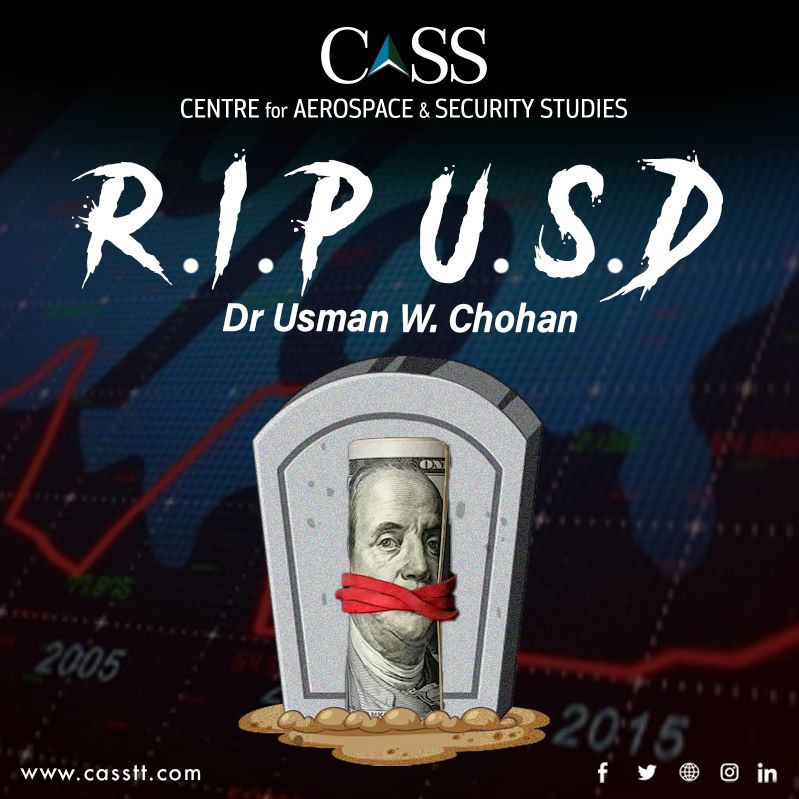The hegemonic role of the US dollar in international trade and commerce is the result of massive upheaval during the early 20th century that culminated in the destruction of most of Europe as well as much of Asia during World War 2. In the 70 years that have since elapsed, however, significant economic growth has occurred around the world, and whereas the US economy accounted for 50% of global GDP as of 1946, today it is closer to 23% and shrinking. Yet there has been a tremendous acceleration over the past year to that otherwise gradual trend of “de-dollarization,” and in no small part is this attributable to the war in Ukraine and the weaponization of the USD against Russia, although other factors such as the poor performance of the US during Covid-19 and the terrible monetary policy of the US Fed also play a role. As a result, we seem to be witnessing an accelerated pace of the “de-dollarization” trend and the onset of a more multipolar economic equilibrium in the world.
Some recent examples illustrate this acceleration. Saudi Arabia and China have come to an understanding towards a “petroyuan” trade that facilitates transactions between the world’s largest energy exporter and energy importer. China and Brazil have signaled the intention of moving away from the dollar towards local currency transactions. France and China have recently settled LNG transactions in Yuan. ASEAN countries have announced a shift away from major currencies including the USD, EUR, and Yen. Several countries are now requesting membership of the BRICS bloc, while China has been instrumental in brokering a thaw between Saudi Arabia and Iran. Russia and China are gravitating their economies towards one another, and one third of its reserves are held in renminbi. At the same time, Russia has created alternate agreements with various countries including Iran, India, and China to circumvent the vast blanket of sanctions imposed on it after its brutal invasion.
The narrative of de-dollarization has also taken root in political discourse within the United States, with some arguing that it is a good thing and a natural process of the US prioritizing its own national interests above that of a subsidized and dispersed empire that doesn’t pull its own weight. After all, the American dollar’s “exorbitant privilege” has meant that, to satiate global demand, the US has had to print more dollars than it would require for its own needs, keeping it in a position of running deficits in perpetuity, at the same time that the provision of its security umbrella in many parts of the globe has meant that it has subsidized the development of other countries which have not had to pay for military upkeep.
However, many view de-dollarization as a sign of an empire in decline, and see the receding prominence of the dollar seems to them damning evidence of how far American power has dwindled. After all, if the dollar is being substituted for other currencies in international trade, it implies that American financial influence has waned and other poles of economic power are emergent that can conduct their own trade and investment policies without regard to US interests. De-dollarization also diminishes the US’s ability to impose punitive economic measures including sanctions, thus reducing the toolkit through which it can exert power over the rest of the world. This we-have-fallen perception is increasingly prominent in American discourse and is the linchpin of narratives posited by disruptive political forces such as the Donald Trump supporter base.
There is some truth to both viewpoints. While it is true that American financial power is reduced by de-dollarization, it is also true that the dollar’s hegemony has been an exorbitant privilege that in itself has sowed the seeds of American decline through deficits and through spending on the maintenance of the empire. But America’s decline in terms of the dollar’s ubiquity does not mean that America itself must decline. It must address structural issues within America itself, including rampant inequality, excess military spending, investment in infrastructure, social protections & healthcare, judicial performance, and primary education. These were the levers of America’s development in the first place, and they are also the typical recommendations that American pundits make to Third World countries. Now those countries can recommend the same best practices to America.
Dr. Usman W. Chohan is Advisor (Economic Affairs and National Development) at the Centre for Aerospace & Security Studies, Islamabad, Pakistan. He can be reached at cass.thinkers@casstt.com.




